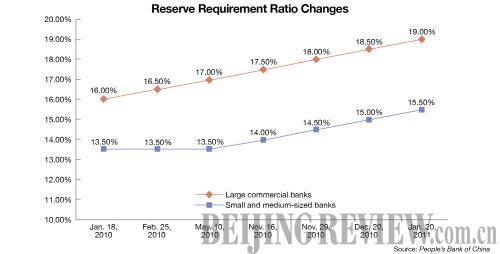|
Major regulator
The central bank shoulders the major responsibility for macro-prudential regulation.
First, the financial regulatory framework includes the People's Bank of China, the China Banking Regulatory Commission, the China Insurance Regulatory Commission and the China Securities Regulatory Commission. Each of these four government departments is responsible for a certain financial sector. However, the central bank's macro-regulation measures related to the money supply, interest rates and foreign exchange rates cannot effectively identify or prevent internal risks of particular financial institutions. Likewise, the micro-regulation by the three commissions over financial institutions cannot effectively guard against macro-risks. How to improve macro-prudential regulation under the current financial system is a major topic confronting regulators.
Second, the central bank has been shouldering the major responsibility for macro-prudential regulation. Internationally, the financial crisis has taught decision makers strengthening implementation of macro-prudential policies has become a consensus in the international community. Now, nearly all countries regard the central bank's macro-prudential policies as the core of financial stability.
The Financial Stability Board, the Basel Committee on Banking Supervision and other financial standard-setting institutions are researching possible policies to enhance macro-prudential regulation. They are also setting up relevant mechanisms to ease the effect of cyclical factors on the economy, raising supervisory standards for key financial institutions, and improving relevant risk disposal and clearance arrangements. Those tasks fall on the central banks of all countries.
Chinese central bank governor Zhou Xiaochuan expressed the same concern, saying, "China will further research the framework for macro-prudential regulation, analyze the policy tools and effects, rethink the central bank's role in macro-prudential regulation and the relations between monetary policy, financial stability and macro-prudence."
Judging by the current legal system in China, and the separate regulatory system where banking, securities and insurance are supervised by different watchdogs, the central bank in effect transfers key supervisory rights to other bodies and thus is only responsible for making monetary policy and safeguarding financial stability.
As for the supervision and prevention of unstable factors in the financial system, the central bank can directly make monetary measures to maintain financial market stability, and can also cooperate with other financial supervisory departments to carry out effective supervision in a timely way. In addition to its normal responsibilities, the central bank's role in macro-prudential regulation must be strengthened and the bank should be granted the right to supervise large financial institutions with system-wide importance.
The central bank still needs to improve its macro-prudential regulation in many aspects, including the central bank's essential role, policies and tools, as well as their effects.

| 